Neo-Cons David Frum, Douglas Murray Secretly Drafted Speeches for Israeli Ambassador
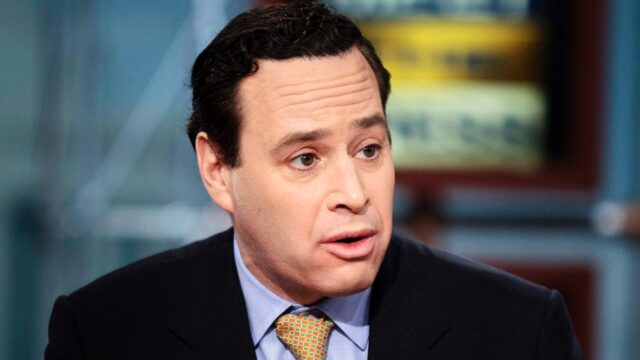
Leaked emails from former Israeli UN Ambassador Ron Prosor show David Frum, Douglas Murray offering to write his speeches and a CNN producer fundraising for Israel’s Iron Dome during Israel’s 2014 war
David Frum, a senior editor at the liberal flagship magazine The Atlantic, had previously enjoyed a career as a speechwriter for George W. Bush, helping Bush coin the notorious phrase “Axis of Evil.” Since that time, Frum has enjoyed the limelight as a celebrated political pundit of the anti-Trump resistance movement.
Despite that shift in careers, it seems that Frum never fully gave up his true love: writing speeches for powerful political figures.
Frum started his senior editorial role at The Atlantic in March 2014. In July of 2014, during an Israeli military campaign in the Gaza Strip that killed over 2,200 Palestinians, including over 551 children, and wounded over 11,000, Frum helped write a speech for the then-Israeli ambassador to the United Nations, Ron Prosor. Prosor is now ambassador to Germany.
At the time, Israel was facing intense scrutiny for its conduct during the 2014 war. According to hacked emails from Prosor’s inbox, the situation brought out an array of journalists and producers, including Frum, British journalist Douglas Murray, and former CNN producer Pamela Gross, to offer direct assistance to Israeli government officials on how to best make their case to the public—including by directly writing and workshopping their speeches, in the case of Frum and Murray, or even offering to privately help fundraise on behalf of the Israeli military, as in the case of both Murray and Gross.
The correspondence between Prosor and the journalists and editors is contained in a database of emails from the former ambassador obtained by the hacking group Handala and recently posted by Distributed Denial of Secrets, a non-profit whistleblower and file-sharing website.
In an email from July 31, 2014, during the height of the Israeli military offensive in Gaza, Frum sent Prosor a message laying out the draft text of a speech for the ambassador. In the message, Frum said that he had been working on the draft with fellow writer Seth Mandel, employed by the neoconservative publication Commentary. In the message, entitled, “an earlier draft of that speech I sent you,” Frum wrote, “This version was drafted by Seth Mandel of Commentary, with whom I’ve been working. The top half is identical to what you read previously. The bottom half is much less pointed about US policy. Is this more in line with your thinking?”

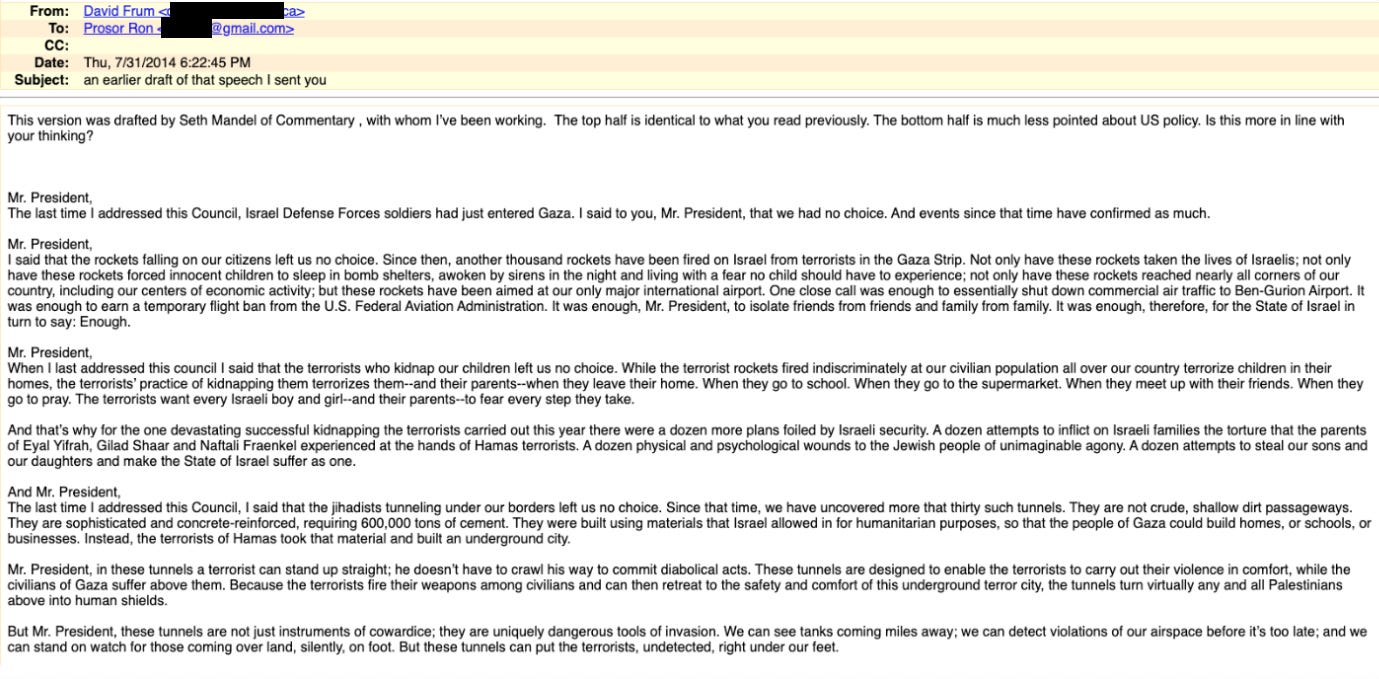
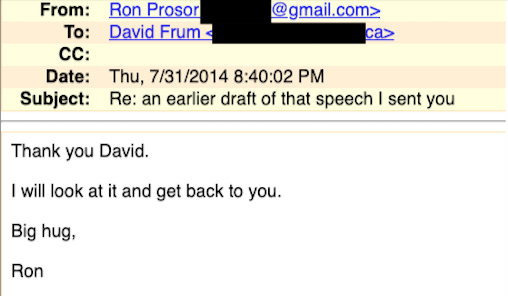
The speech itself contained florid language about the “free world’s defeat of the Nazi war machine,” describing Israel’s war against the captive population of Gaza as “the most tenacious challenge to the free world in decades.”
Though evidently written with the intended audience of the UN Security Council — it referenced a speech Prosor had given earlier that month — much of the message implored Americans to continue supporting the Israeli war effort, warning them against being “war weary,” while invoking weighty historical symbols like President Harry Truman, the Marshall Plan, and the formation of NATO after the Second World War. Prosor was noncommittal about the draft and it is unclear whether he ever used the text for an address, telling Frum that he would read it over and get back to him. (On August 1, Frum sent Prosor a message titled, “speech?” with the message “overtaken by events?”)
The day before he sent Prosor the speech, Frum had reached out to the ambassador from a separate email address in a different capacity—as a journalist ostensibly aiming to profile a subject. Frum asked Prosor, “Also—Can I interview you for short (sic) profile in Atlantic about what it’s like to be Israeli ambassador at UN?”
Prosor forwarded the message to his staff at the Israeli Ministry of Foreign Affairs. In late September 2014, The Atlantic published a profile of Prosor authored by Frum entitled “Israel’s Man at the United Nations.” The piece lauded the diplomat for his “toughness” and effective advocacy for Israel at the international body, as he fought to rally support for the war and avert “a one-sided or punitive Security Council resolution.”
“The Soldiers Were Superb”
Frum was not the only writer playing both sides of the field and attempting to help the ambassador rally support for Israel at a time when the country was under international pressure. At the same time, in a separate set of messages, British journalist and author Douglas Murray, an associate editor at the UK publication The Spectator, was pitching Prosor on his own version of a speech to be given at the UN.
In a message entitled simply, “Draft,” Murray wrote Prosor on July 31, 2014, “Dear Ron, Very good to speak earlier. I am pasting in here my first draft ideas. It’s probably slightly long. And it’s possible I have put in some more diplomatic things than needed… But I think I have got in all the points discussed.” The speech contained Murray’s own suggested speech for Prosor to deliver to the UN, including phrases like, “We Israelis have learnt to live with the realities around us. We know who we are,” criticism of the “outrageous and racist efforts to boycott Israeli products,” and derogatory comments about European Muslims.
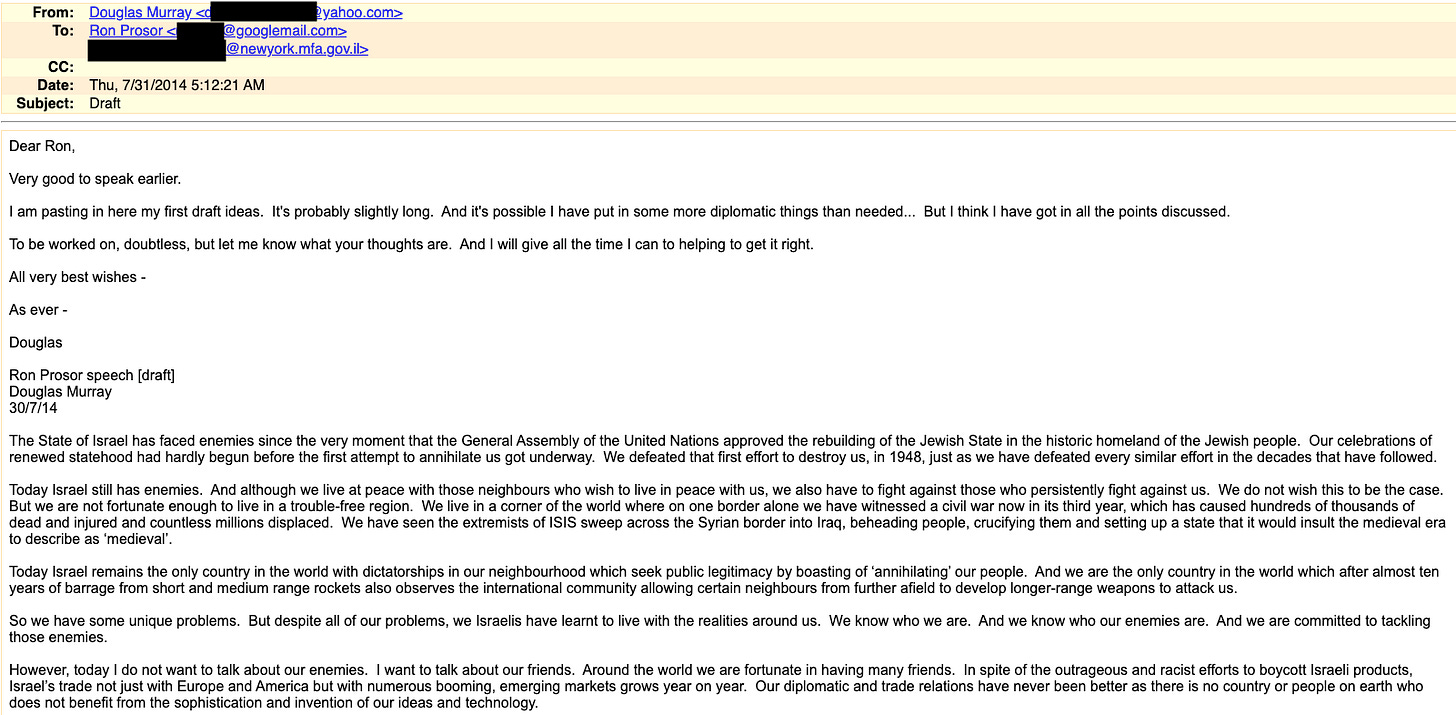
Murray added that Prosor may want to work on the speech more to develop it to his liking, offering his own services in that regard. “I will give all the time I can to helping to get it right,” he wrote.
The two maintained a sparse correspondence in the following months, with Murray mostly sending messages sharing his articles and lavishing praise on the ambassador, whom he said in an August message was “doing wonderful work as ever.”
At the time, Murray was also providing other services in support of Israel and its military efforts. In November of that year, he wrote to Prosor to inform him that he had hosted an event that raised over one million pounds for an organization called, “The Association for the Wellbeing of Israeli Soldiers,” (AWIS). That organization had been created to provide funds “directly to [Israel Defense Forces] soldiers and IDF units,” and was originally founded in 1942 by Israel’s first prime minister, David Ben-Gurion. (In 2015, AWIS merged with another organization and is now called The Association for Israel’s Soldiers.)

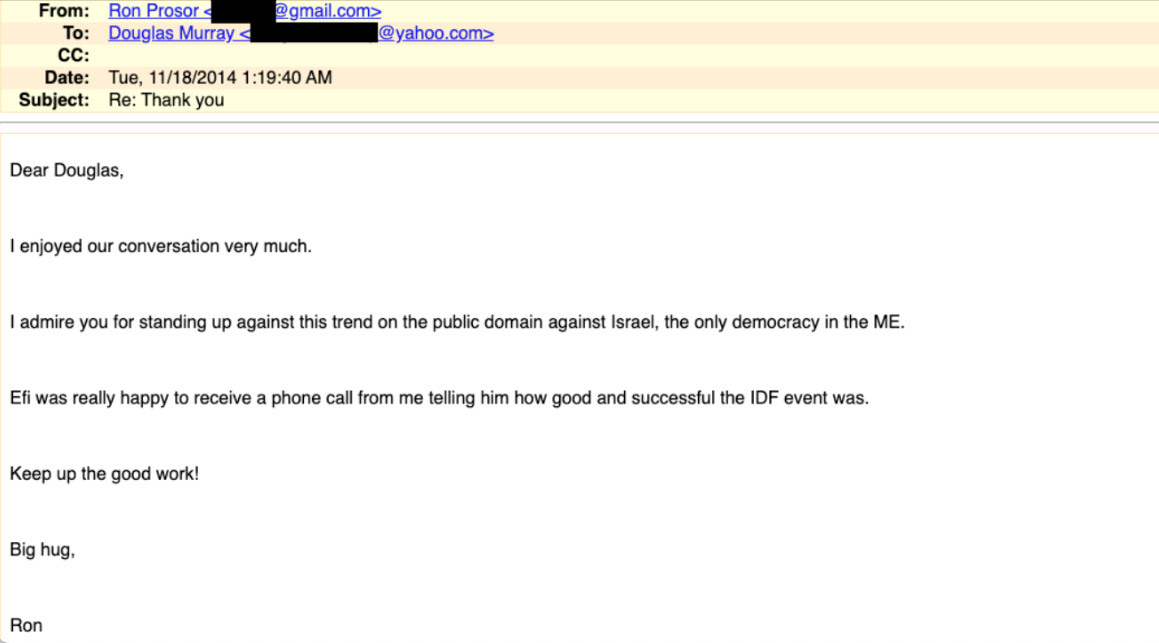
In his messages, Murray could scarcely contain his happiness at assisting Prosor with his work and even spending time together. “I just wanted to drop a line to say thank you so much for sparing the time to see me in NY. It was very kind of you and really terrific to see you,” he wrote in the message on November 15, 2014. He told the ambassador that he had successfully caught his flight in time after their meeting, mentioning the AWIS event which he said was “one of the most successful ever,” and adding that “the soldiers were superb.”
Murray added that he hoped to see the ambassador again soon and told him to, “always call if I can ever do anything to help.” Three days later Prosor gave Murray a thumbs-up on his good work in reply, thanking him for his fundraising and advocacy efforts for the Israeli government, while signing off, “Keep up the good work!”

Murray has made much of his devotion to the craft of journalism. In a debate against comedian Dave Smith, hosted by podcaster Joe Rogan and watched by many millions in April of this year, he made the case to Smith that Smith was unqualified to discuss the humanitarian aid situation in Gaza because he had not visited the crossings. “You’ve never been?” Murray asked in feigned shock. “I have a journalistic rule of trying never to talk about a country, even in passing, unless I’ve at least been there.”
Journalists are also supposed to avoid even the appearance of a conflict of interest. When Murray visited a crossing accompanied by the IDF, he wore a flack jacket labeled “PRESS.” Journalistic rules would suggest Murray ought to have disclosed to his audience that he had fundraised and written speeches for the very entity he was now covering as a journalist.
“True Assets to the State of Israel”
In the ensuing months, Prosor kept a lively correspondence with senior editors at a range of publications, as well as close relations with television producers who made no secret of their own political motivations in supporting his work.
In emails to Prosor over a number of years, Pamela Gross, at the time an editorial producer for CNN, contacted the ambassador to book him for guest appearances, but also invited him to birthday parties and arranged dinner engagements with her and her husband, James (Jimmy) Finkelstein, the owner at the time of the publication The Hill. (The Hill also owned the show, “Rising,” where Drop Site’s Ryan Grim previously served as a co-host.) In addition to their warm personal ties, Gross also solicited Prosor’s help in a private effort to fundraise money to supply Israel’s Iron Dome missile defense system.
In a message dated July 10, 2014, Gross wrote Prosor, “Dear Ambassador – It was so wonderful to see you this 4th of July. Thank you for joining us. Clearly Iron Dome is doing the trick and saving lives. Please dear friend – let’s get it finished. Please let me know what is still left to be done at your soonest convenience.”
Some hours later Prosor responded by thanking her and Finkelstein for a “magical evening” and being “perfect hosts,” adding, “Pamela, the amazing work that you are doing in fundraising for the Iron Dome project has the most relevant and vital value to the life of the people in Israel. You and Jimmy are true assets to the state of Israel and the Jewish people.”

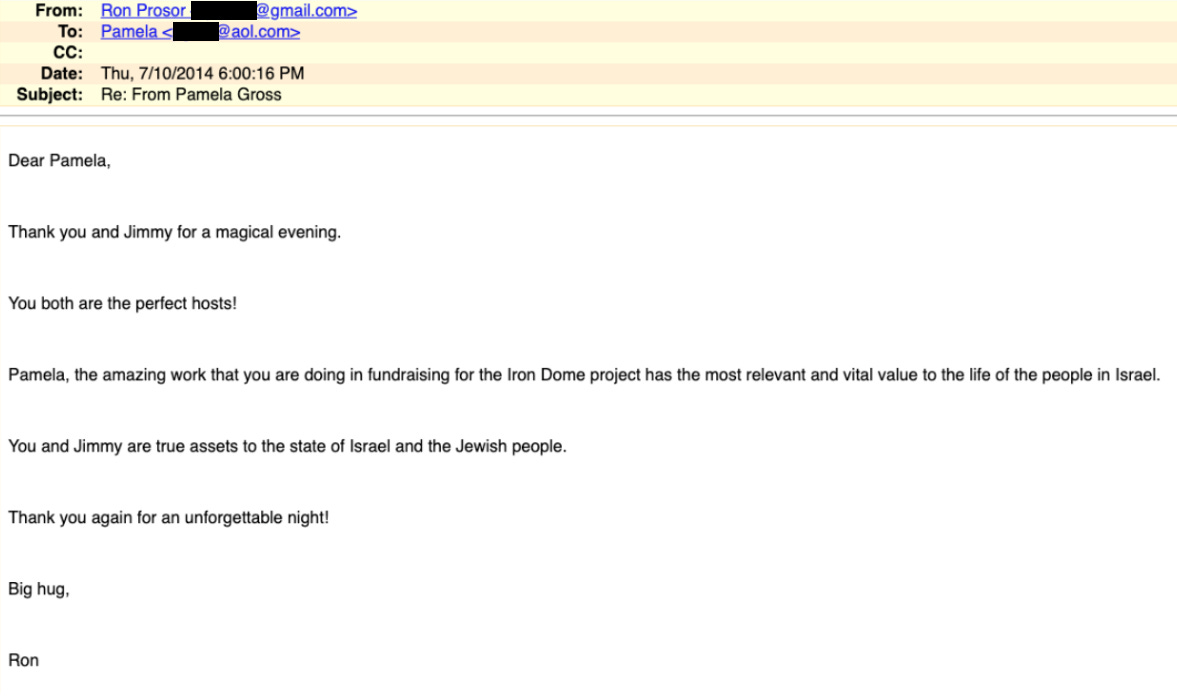
The next day Gross back wrote to Prosor to ask for guidance from him and the Israeli Ministry of Foreign Affairs on how to get started. “Darling Ambassador – I have not begun any fundraising on the Iron Dome yet but am anxious to move forward. I need to gather information and so hoped you could help me. I need to know the facts, such as, how much $ do they still need to finish the dome?,” the CNN producer wrote, in an email that included her professional affiliations in the signature section.
She further asked the Israeli ambassador whether there is, “someone in your office who can assist me in gathering critical information on this project so I can get moving?”
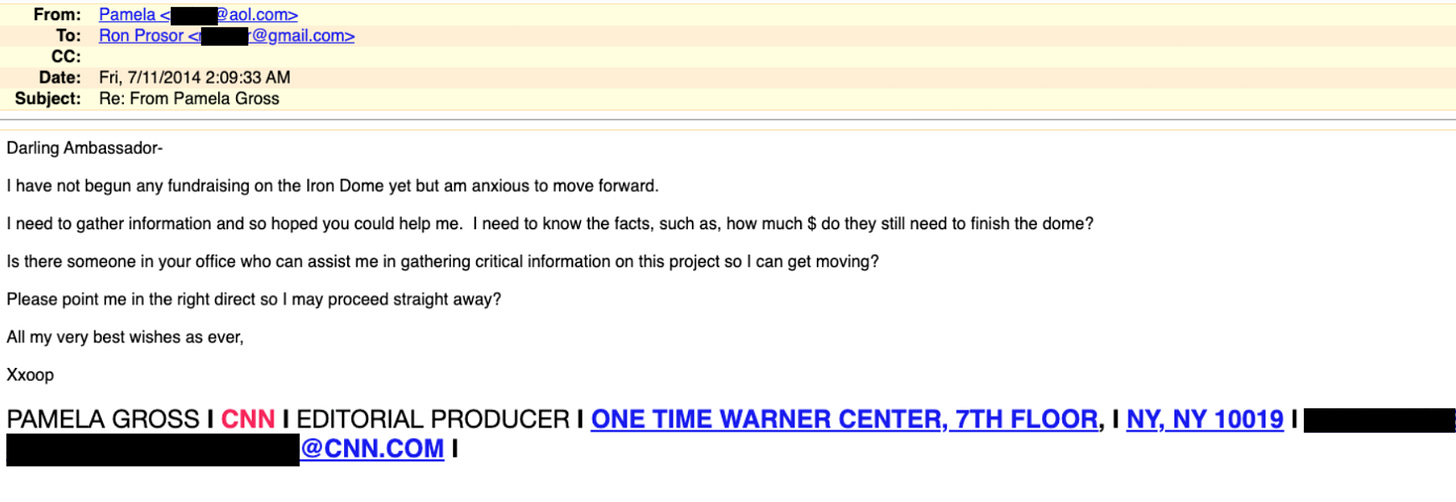
A few days later Gross followed up again about how to help with Iron Dome. “Please, dear Ron, I will need to assess the funds needed and then who to send all monies to once raised,” Gross wrote. “May I please impose upon you to put me in contact with the appropriate person/persons in your office who might be able offer (sic) me advice and information that could start me off on this terribly important endeavor.”
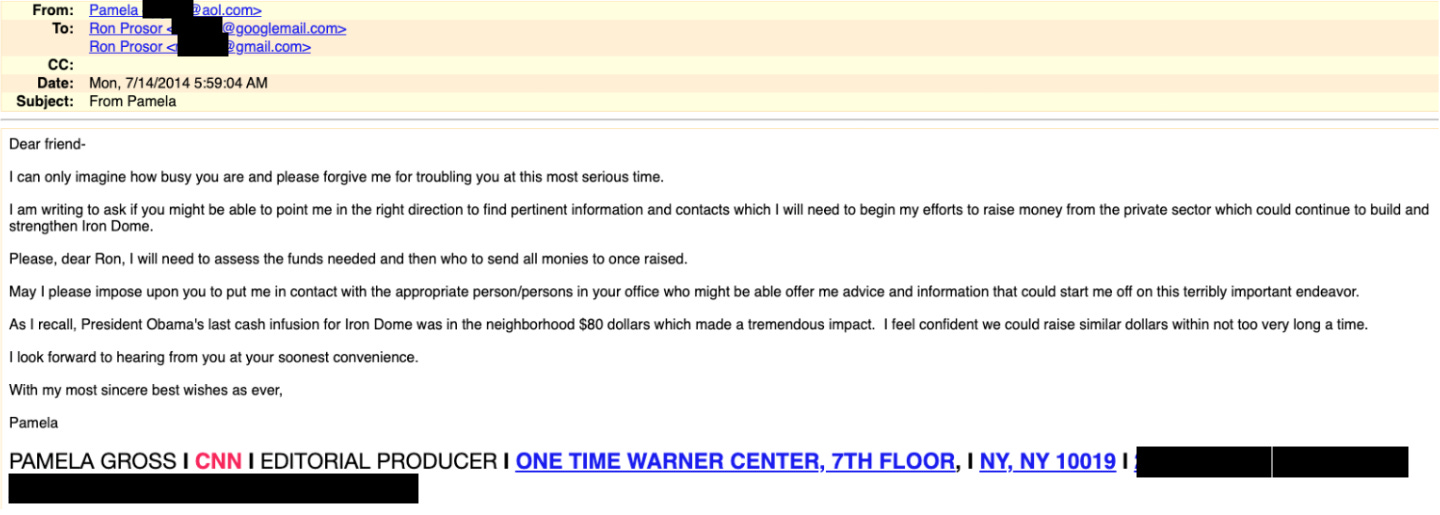
She added, “As I recall, President Obama’s last cash infusion for Iron Dome was in the neighborhood $80 dollars(sic) which made a tremendous impact. I feel confident we could raise similar dollars within not too very long a time.”
Gross left CNN in 2017, and the available contents of Prosor’s emails taper off around early 2016. But the two maintained a correspondence during this time, with Gross continuing to contact Prosor to book him for guest spots on CNN and keep him abreast of developments in their shared social circles.
In a message dated February 27, 2015, Gross wrote to Prosor to book him on CNN while also telling him that she had just met former Israeli prime minister Ehud Barak, stating, “Jimmy and I were just thinking of you as we had dinner the other night with Ehud and Mrs. Barak, who we had never met before, and enjoyed getting to know very much. Of course we mentioned how close we have gotten to you.”
She added that Prosor’s “ears must have been ringing between the four of us wildly singing your praises,” before asking about his “availability to join us on CNN TONIGHT this coming Monday, March 2, 2015 to weigh in on PM Netanyahu’s address to the US Congress.” Prosor warmly declined, telling Gross that he would be with Netanyahu personally at the time in Washington and would be unable to make it to a studio.

The emails hacked by Handala and posted by Distributed Denial of Secrets did not have metadata that would allow their authenticity to be verified, but they contain hundreds of photographs, documents, and other information from Prosor and his contacts, including non-public information verified as accurate by Drop Site. In its message posting the emails, Handala also issued a threat against Prosor’s life, stating “Your death is near.”
In 2020, Gross and her husband made the news after word broke that Finkelstein had used his connections with the first Trump administration to get her a role as an unpaid advisor to Melania Trump while he owned The Hill. In a statement to Politico, Finkelstein rejected the claim that there had been a conflict of interest in her undisclosed role, stating that, “Pamela was proud to help the first lady serve our country and the nation’s children in this way. For Pamela, this was not simply a very worthwhile effort. It was deeply meaningful on a personal level. As the daughter of a 91-year-old Holocaust survivor sent to the Auschwitz death camp as a child, she felt that joining the first lady in helping children, here and around the globe, was tremendously humbling and personally rewarding.”
Reached for comment about his interactions with Prosor, Frum referred questions to the communications department at The Atlantic which did not respond to request for comment. Murray and Gross did not respond to repeated requests for comment. Mandel, CNN, and the Israeli Embassy in Germany where Prosor is now serving also did not respond to request for comment.
https://www.dropsitenews.com/p/david-frum-douglas-murray-secretly
